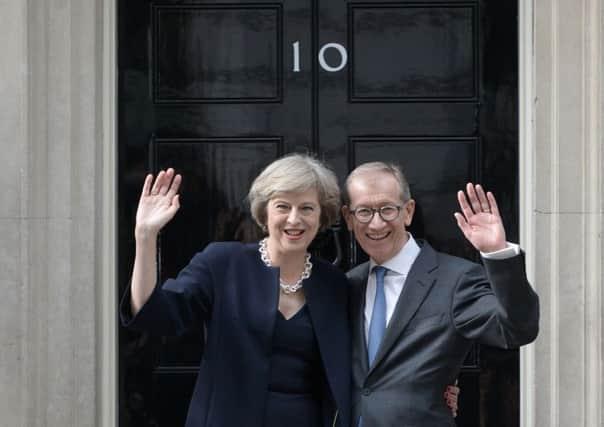Euan McColm: Theresa May should give voters a chance to say whether they approve


Lord Hague – in common with other Tory peers and MPs – believes that a snap election would strengthen the Tories’ hand when it comes to driving ahead the UK’s departure from the European Union. Not unreasonably, Lord Hague reckons that his party could wrestle seats away from Labour if May would go to the country, now.
The Tory peer – and others in his party who share his conviction that an early election would make perfect sense – are to be disappointed. Downing Street continues to rule out any attempt to overturn the fixed term parliament legislation that means the next general election is scheduled for 2020. As far as May is concerned, it is her job to get on with the work the Conservatives were elected, in 2015, to carry out. There is a problem with this position: the Conservative government elected in 2015 and the current Conservative government are very different creatures indeed.
Advertisement
Hide AdAdvertisement
Hide AdThere are compelling political reasons for May to call an early election. Under Jeremy Corbyn’s leadership, Labour’s poll ratings are dire. The Prime Minister could safely bet the family silver on her party returning to the House of Commons with an increased majority.
It is not only Tory politicians who would like to see an early election. Some Labour MPs, desperate to be rid of Corbyn, would prefer crushing defeat now rather than waiting, in silent, soul-devouring despair for the inevitability of crushing defeat in 2020. If Labour is to have any chance of turning its fortunes around (and I’m not convinced that, with the brand so tarnished, it can do so) then Corbyn has to go sooner rather than later.
But it is not for reasons of political gain that the Prime Minister should, I believe, call an early election. May should go to the country for the good of our democracy.
David Cameron had a clear mandate to govern after the 2015 election. May does not enjoy the same authority. The manifesto on which the Conservatives stood two years ago gave the former Prime Minister the right to hold the EU referendum. It did not give the Tories permission to achieve Brexit at any cost.
UK politics has been transformed by Brexit. Old divisions between left and right have been replaced by an argument that takes place along constitutional lines. Victory for the Leave campaign in the EU referendum necessitates the prioritisation of the UK’s departure from Europe over all other matters. In these new circumstances, the UK government requires a fresh mandate.
The Prime Minister could trigger Article 50 – kickstarting the process by which the UK will leave the EU – as early as this week. Once that happens, the government will have to make inevitably controversial decisions on a raft of matters, from immigration to the economy. May and her cabinet will be taking decisions in a set of circumstances – in a world – that’s changed beyond recognition.
The Tories would romp a general election if May was to call one tomorrow. Labour would help turn a slender Conservative majority into a properly chunky one.
It is hardly bold to predict that the Brexit process will be fraught with tensions and slowed by fierce disagreement. It is in nobody’s interest for Brexit to be messier than it has to be. A general election, granting the Conservatives a proper mandate to do what they must in order to see Brexit through to its miserable conclusion, would help make the process smoother.
Advertisement
Hide AdAdvertisement
Hide AdDavid Cameron’s government – centrist to a New Labourish degree – and Theresa May’s, with a phalanx of monomaniacal right-wing Eurosceptics at its heart, bear little resemblance to each other. Ideology aside, the difference between the two governments is that Cameron’s had the blessing of a majority of voters to do what it had pledged to do in its manifesto. Cameron played the central role – with support from Labour’s hapless Ed Miliband – in getting the Tories into power. May has done nothing to earn the right to do whatever she wishes on Brexit.
Pedants will insist that we do not, in the UK, elect the head of government. We simply elect a local MP and the leader of the party that wins the most seats either – if a majority is won – becomes PM or – if the result is a hung parliament – has first dibs on trying to form a government. And, yes, this is true. But it is also not really true, is it?
We may not have a presidential-style election system with the names of potential national leaders on the ballot paper but, that detail aside, of course leaders matter. A glance at both the pitiful approval ratings for Corbyn and his party’s dire polling reminds us, should that be necessary, that, for a great many of us, a general election is precisely like a presidential one.
Shortly after his election as Labour leader – and subsequent installation as Prime Minister – in 2007, Gordon Brown had his team brief that he was ready to call an early general election. Speculation was nourished by frequent tidbits from spin doctors and when, eventually, Brown decided against going to the country, colleagues and opponents alike could not understand why he had squandered the opportunity to win his own mandate and strengthen his party in government.
Brown’s reputation as an “Iron Chancellor” was rather undermined by his behaviour as PM.
May enjoys the luxury of having a useless opposition; her failure to call an election will not mean a lift for the fortunes of Jeremy Corbyn. But, just as Gordon Brown should have, she should secure her own mandate.
Democracy demands we get a government that best reflects the preference of the majority. Theresa May doesn’t currently have the right to claim her team fulfils that criterion.